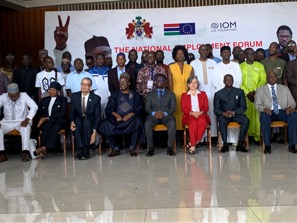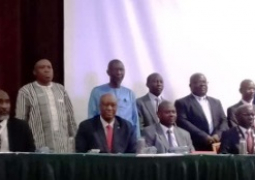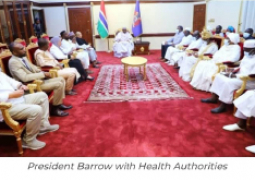
The initiative is designed to create “150,000 decent jobs” by 2026.
The event follows the launch of the National Employment Policy and Action Plan 2022-2026 by President Adama Barrow in November 2022, reaffirming the government’s commitment to addressing the country’s employment challenges.
The National Employment Forum seeks to address pressing employment issues, promote job creation, and foster public-private sector collaboration. The forum brought together policymakers, industry leaders, academics, and youth representatives dedicated to enhancing employment opportunities in The Gambia.
During his keynote address, Trade Minister Baboucarr Joof emphasised the importance of the forum theme: ‘Creating Employment Through Strategic Investment and Innovative Skilling’.
He stated: “This theme redefines and repositions my Ministry’s commitment to addressing the dynamic labour market needs amidst national and global advancements in technology.”
Mr. Joof highlighted that the National Employment Policy aims to create 150,000 decent jobs by 2026, driven by innovative strategies and strengthened partnerships. “Our convergence in this forum underscores the government’s unwavering commitment to addressing the key issues at the heart of our employment landscape,” he remarked.
He further stressed the need to tackle youth unemployment and job stereotyping by implementing public employment programmes focused on migration and job creation. “My ministry will propose some insightful public employment programmes on migration and employment creation from pilot to a fully-fledged programme,” he added.
The Trade Minister acknowledged the importance of embracing digital skills development in today’s evolving job market. “In this dynamic world of work, digital labour skills are critical. We must embrace innovation to equip our workforce with the tools they need to thrive,” he noted, referencing the ongoing West African Regional Digital Initiative Project (WARDIP) supported by the World Bank.
He also recognised the efforts of the Ministry of Higher Education, Research, Science, and Technology and the Ministry of Basic and Secondary Education in integrating digital skills into the national curriculum.
Mr. Joof expressed profound gratitude to development partners, including the European Union, UNDP, GIZ, IOM, and ILO for their technical assistance and continuous support in advancing The Gambia’s employment goals. He commended the National Employment Technical Committee for guiding policy alignment with the country’s labour market needs.
He reaffirmed the government’s dedication to implementing the National Employment Policy and enforcing the Labour Act 2023. “By this undertaking, we wish to focus on creating an enabling environment for job creation, promoting private-sector-led economic growth, and ensuring that our labour market adapts to evolving global trends,” he concluded.




